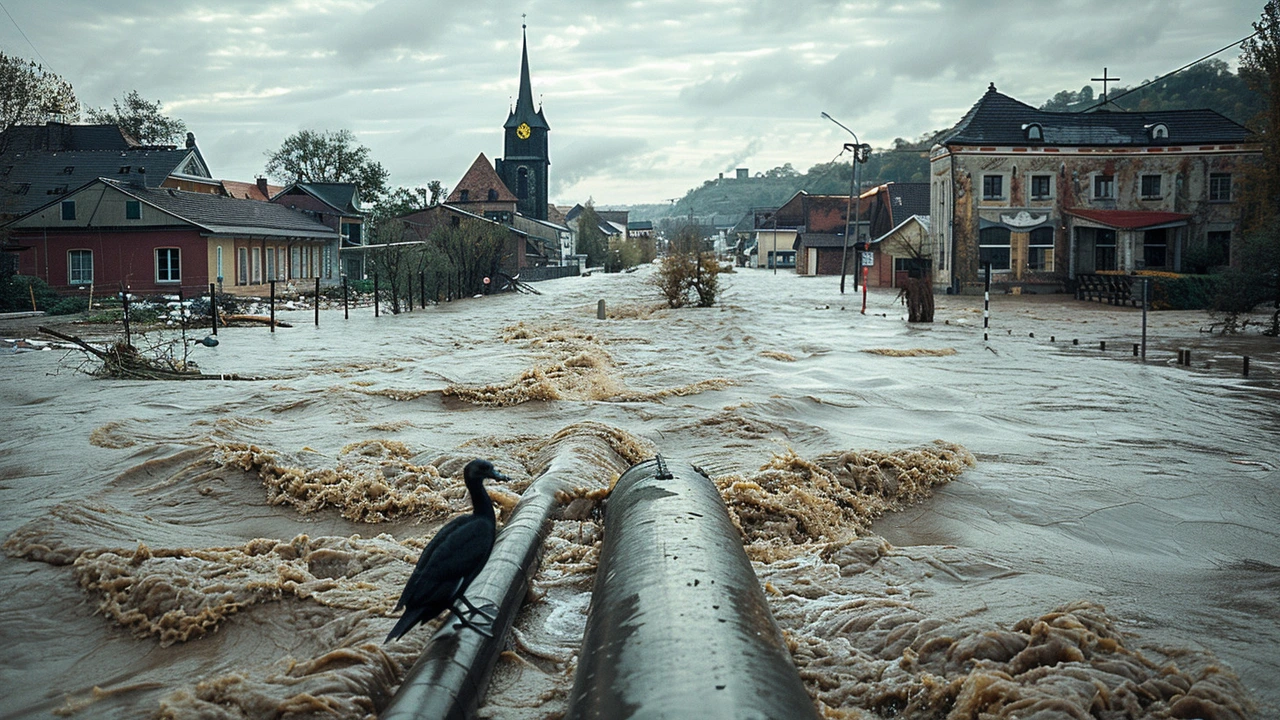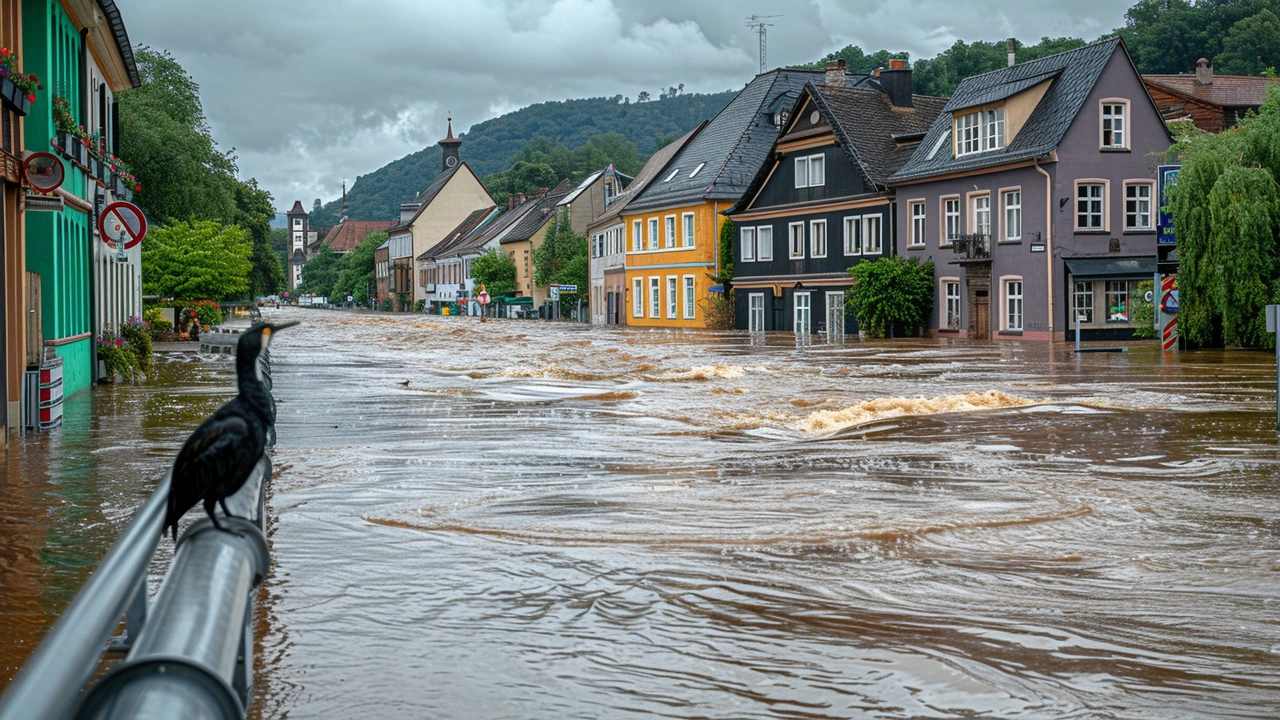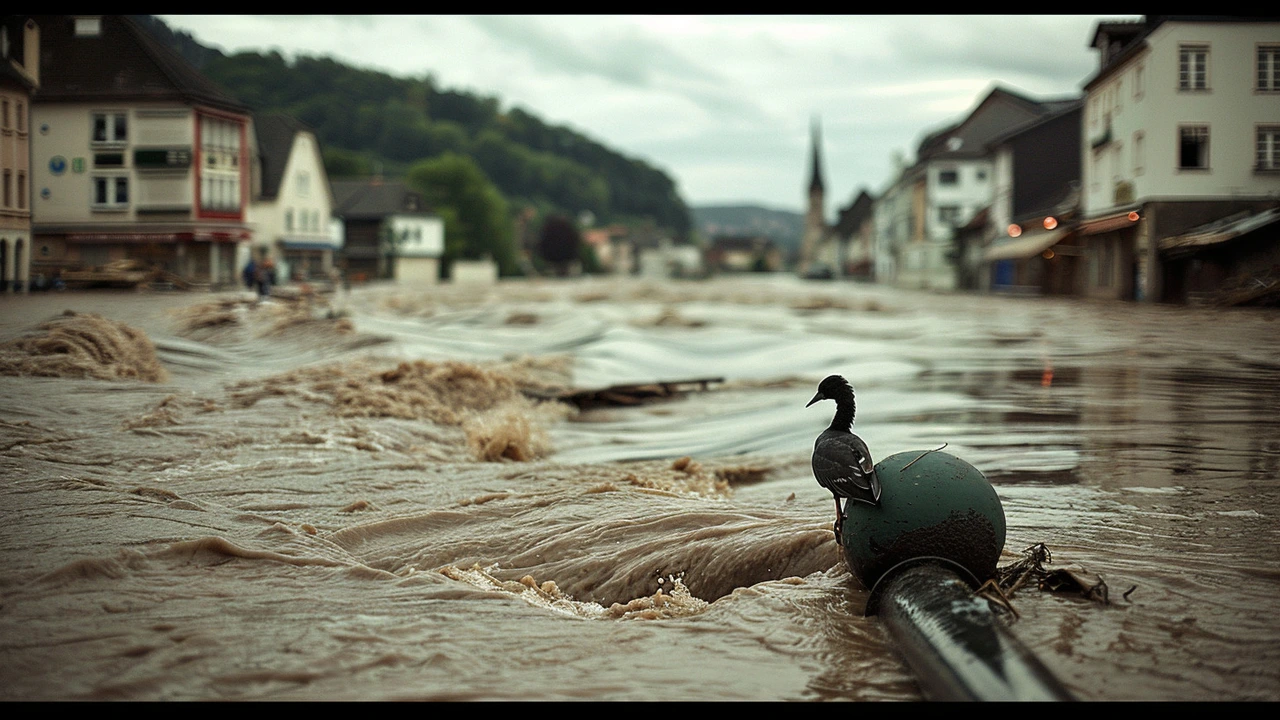Tragic Deaths as Flooding Ravages Southern Germany
Severe flooding has claimed the lives of four people in southern Germany, with the calamity causing immense disruption and distress among residents. The floods resulted from incessant heavy rainfall that overwhelmed waterways, leading to devastating consequences. Emergency services have been working tirelessly to manage the disaster and save lives, but the situation remains dire.
Among the deceased was a 43-year-old woman from Schrobenhausen, whose body was found in a submerged basement, a tragic reminder of the flood's deadly impact. Another victim is a firefighter who tragically drowned when a rescue boat capsized in Pfaffenhofen. These occurrences have underscored the dangers faced by both residents and first responders during extreme weather events.
Transport Disruptions Amplified by Flooding
In addition to the loss of lives, the flooding has wreaked havoc on transport systems, causing significant disruptions. Long-distance rail routes to Munich have been suspended, causing major inconveniences for daily commuters and travelers. Roads have been submerged, and local transport services are severely affected, making it difficult for people to reach their destinations.
The transport disruption is particularly critical as it has hindered the movement of emergency services and relief efforts. Authorities are working around the clock to restore some semblance of normalcy, but the persistent rainfall makes the task daunting. The economic impact, while secondary to the loss of life, is also considerable, with businesses and daily activities severely hampered.
High-Level Visits and Urgent Discussions
German Chancellor Olaf Scholz visited Reichertshofen, a town heavily impacted by the flooding, to assess the situation firsthand. During his visit, he engaged in discussions with local and regional officials, including Governor Markus Söder, who provided updates on the ongoing challenges and response measures.
Chancellor Scholz expressed his condolences to the families of the victims and acknowledged the heroic efforts of emergency responders. He highlighted the need for immediate and long-term strategies to mitigate the effects of such disasters. Governor Söder stressed the critical and tense nature of the current situation, noting that water levels were expected to rise further, adding to the urgency for effective intervention.

Climate Change: A Contributing Factor
Both Scholz and Söder emphasized the link between the frequency of such natural disasters and climate change. Scholz pointed out that the recurrence of extreme weather events, such as the recent floods, underlines the urgent need for comprehensive climate action.
This sentiment is echoed across the scientific community, where experts warn that climate change is intensifying rainfall events, leading to more severe flooding. The recent events in Germany are part of a broader pattern being observed globally, where extreme weather conditions are becoming the new norm. Addressing climate change is not just a matter of environmental policy; it is crucial for safeguarding lives and preventing further tragedies.
Community Resilience and Response
The flooding has showcased the resilience and solidarity among the affected communities. Despite the devastation, residents have come together to support each other, providing shelter, food, and other essential services to those in need. Local authorities have set up emergency centers and are coordinating relief efforts, ensuring that the most vulnerable populations receive timely assistance.
Volunteer groups, NGOs, and local businesses have also stepped in, demonstrating the spirit of cooperation and mutual aid. Such community-driven efforts are vital in managing the immediate impacts of the disaster and aiding in the longer-term recovery process.

Preparing for the Future
As Germany grapples with this most recent calamity, it is clear that there is a pressing need for better preparedness and infrastructure to withstand such events. Investments in flood defenses, improved drainage systems, and early warning mechanisms are essential steps that need to be taken to mitigate future risks. Policymakers are now faced with the challenge of balancing immediate relief efforts with long-term planning and strategy implementation.
The tragic events serve as a stark reminder that while nature’s fury may be beyond human control, the impact can be managed through well-coordinated and proactive measures. The lessons learned from these floods will hopefully drive more resilient and adaptive strategies to prevent such loss of life and disruption in the future.
Conclusion: A Call to Action
The severe flooding in southern Germany has not only led to a significant loss of life but has also disrupted daily life and brought to light the vulnerabilities within our systems. As the nation mourns the victims and extends support to the affected areas, there is also a growing recognition of the need to confront and combat climate change proactively.
Leaders like Chancellor Scholz are calling for urgent action to address the root causes of such disasters. It is a call that resonates globally as countries worldwide face similar challenges. The time for action is now, to build a safer and more resilient future for all.

17 Comments
fatima almarri
June 5 2024
this is just heartbreakin. i keep thinkin bout that woman in the basement... how scared she mustve been. we need better early warnings, like, yesterday. climate change isnt a theory, its our reality now.
im from india, we get monsoons too, but this... this feels different. like nature’s scream turned into a roar.
deepika singh
June 6 2024
omg i just cried reading this 😭 the firefighter?! like... he was tryna save people and lost his own life?? that’s next-level bravery.
also shoutout to all the random folks handing out food and blankets-those are the real heroes, not the politicians on TV. we need more of that energy.
amar nath
June 7 2024
yo so germany’s floods are wild but yall know what’s wilder? the fact that they still have trains running in 2024. in my village we got flooded last year and the only transport was a goat cart.
also why is everyone actin like this is the first time water broke the rules? we been warnin since 2010. why u always late to the party climate?
Pragya Jain
June 9 2024
this is what happens when you let immigrants flood your country and then blame nature. Germany should’ve built stronger borders, not stronger levees. these floods are a distraction. look at the real crisis: cultural decay.
Shruthi S
June 10 2024
this is so sad... 😢 i just hope everyone finds safety soon. sending love to all the families affected. you're not alone 💛
Neha Jayaraj Jayaraj
June 11 2024
okay but have y’all seen the videos?? the water was literally swallowing cars like they were toys 😱 and the chancellor? he was wearing a blazer. like... are you serious??
also i bet the guy who drowned was just trying to take a selfie with the flood. #FloodTok
Disha Thakkar
June 13 2024
i mean... the fact that they’re still talking about 'climate change' as if it’s some newfangled concept is frankly embarrassing. we’ve had droughts, floods, hurricanes since the Cretaceous.
what’s really happening here? a performative political theater designed to distract from the real issue: the collapse of civil infrastructure due to decades of bureaucratic inertia.
also, who authorized the use of 'hero' in reference to firefighters? that’s a word we’ve been commodifying since 2016.
Abhilash Tiwari
June 14 2024
man, i just sat here for 10 mins stare at this article. no words. just... quiet.
the part about the firefighter? that hit different. reminds me of my uncle who passed in the 2018 Kerala floods. they don’t tell you how heavy a wet uniform gets when you’re tryna carry someone out.
Anmol Madan
June 16 2024
hey so i was in Munich last month and the train station was clean as hell, like, i could eat off the floor. now this? wild.
anyone know if the McDonald’s near Hauptbahnhof is still open? i need fries rn 😅
Shweta Agrawal
June 16 2024
this is so tragic and everyone is doing their best and i just hope the children are okay and the animals too and maybe someone can help with the elderly and the food supply and the blankets and the clean water
raman yadav
June 17 2024
let me tell you something profound. the flood isn’t the disaster. the disaster is the illusion that we are separate from nature. we built cities on riverbeds, we paved over wetlands, we turned ecosystems into parking lots, and now we cry when the earth says ‘no more’.
the firefighter didn’t die because of water. he died because we stopped listening.
the real tragedy? we’ll forget this by next week. we always do. history doesn’t repeat-it rhymes. and we’re stuck on the same damn verse.
Ajay Kumar
June 17 2024
they say it’s climate change but nobody talks about the real cause: the UN’s Agenda 2030. they’ve been seeding these disasters for years to push the green new deal. why else would the same regions flood every 2 years? coincidence? no.
and why are the media only showing German victims? what about the floods in Pakistan? why no headlines? double standard. controlled narrative. you’re being manipulated.
Chandra Bhushan Maurya
June 19 2024
i saw a video of a cat clinging to a fridge floating down the street. just... floating. like it was on a cruise.
and then a guy jumped in with a paddle and rescued it. i lost it. i was bawlin like a baby. we’re all broken but we still reach for each other. that’s the real miracle here.
Hemanth Kumar
June 21 2024
The structural inadequacies of Germany’s flood mitigation infrastructure are symptomatic of a broader failure in long-term urban planning and risk assessment protocols. While emotional responses are understandable, the policy imperative must shift toward adaptive resilience engineering and data-driven hydrological modeling.
Furthermore, the conflation of meteorological phenomena with ideological narratives risks undermining evidence-based governance.
kunal duggal
June 22 2024
the hydrological modeling in the Danube basin shows a 37% increase in peak discharge intensity since 2000, correlating with a 1.8°C rise in regional mean temperature. this isn’t anecdotal-it’s statistically significant.
we need adaptive infrastructure with AI-driven flood prediction systems integrated with municipal emergency response networks. delay = death.
Ankush Gawale
June 23 2024
i just feel so bad for everyone. i dont know what to say but i hope things get better soon. maybe we can all just be kinder to each other? that helps too.
रमेश कुमार सिंह
June 23 2024
when the rivers rise, they don’t ask for your passport, your politics, or your bank account. they just rise.
and in that moment, we are all the same-wet, scared, holding hands with strangers who become family.
maybe that’s the lesson: we don’t need new laws. we need to remember we’re not alone.
and that’s enough.